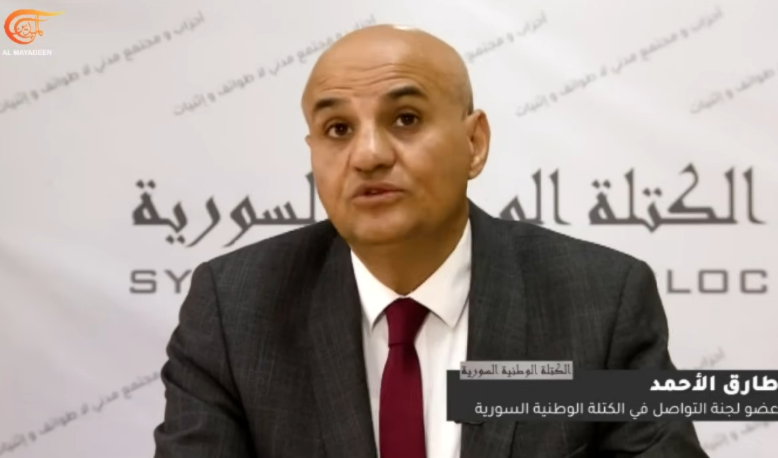Syrian National Bloc defends Syria sovereignty, rejects US-backed deal
The Syrian National Bloc opposes a US-Jordan-Damascus deal, citing threats to Syria's sovereignty as it stresses opposition to "Israel".
-

Syrian National Bloc communication committee member Tarek al-Ahmad (Al Mayadeen screengrab)
The Syrian National Bloc announced its outright rejection of the tripartite agreement signed between the authorities in Damascus, the United States, and Jordan, describing it as exceeding the powers of any interim government and entrenching the division of the country by placing southern Syria under US supervision.
In a statement on Thursday, the bloc voiced support for residents of Suweida who have rejected what was described as a “road map,” affirming its backing for their stance against any deal that undermines Syria’s unity and national sovereignty.
The statement reiterated the bloc’s principled rejection of any agreement with the Israeli occupation, stressing that all forms of negotiation or cooperation with it are entirely unacceptable. It called for the full liberation of occupied Syrian territories through means set out in international laws and conventions.
The bloc also criticized Damascus for granting Washington any representative capacity on behalf of Syria in meetings involving the Israeli regime. It said no security arrangement with “the enemy,” whether in the south or any other part of Syria, can be tolerated, underscoring its call for complete national sovereignty and opposition to foreign interference.
Syrian Foreign Minister Asaad al-Shibani recently revealed that the government had developed a clear roadmap to address events in Suweida. Speaking at a joint press conference in Damascus on Tuesday with his Jordanian counterpart, Ayman Safadi, and US envoy to Syria, Tom Barrack, al-Shibani said the plan laid out practical steps with support from Jordan and the US.
The Syrian National Bloc, founded by prominent political figures, says its mission is to build a democratic civil state based on citizenship and social justice under the slogan “Religion is for God and the homeland for all.” In its founding statement, the group said its establishment aimed to prevent “reproducing dictatorship under a new guise” and to create a state of full and equal citizenship to safeguard sovereignty and genuine freedom.
'Agreement with Israel necessity'
Syrian Transitional President Ahmad al-Sharaa revealed on Wednesday that ongoing security talks with "Israel" could yield results in the coming days, marking the most direct acknowledgment yet of progress in US-brokered negotiations.
Al-Sharaa stressed that any potential security agreement was a “necessity,” but conditioned its success on respecting Syria’s sovereignty.
“The agreement must guarantee Syria’s airspace and territorial integrity,” he stated.
While not ruling out broader outcomes, he underlined that “peace and normalization are not on the table now.” Instead, the discussions are focused strictly on security de-escalation and reaffirming commitments to existing ceasefire arrangements.
Talks amid ongoing aggression, occupation
Israeli media outlets reported Thursday that a lengthy meeting took place in London between Israeli Strategic Affairs Minister Ron Dermer and al-Shibani, with Barrack mediating.
According to Israeli outlets, the five-hour meeting included Syria’s formal response to an Israeli proposal for a security agreement. The same reports, however, suggested skepticism in Tel Aviv, with i24NEWS noting that chances of reaching a deal in the near future had receded despite what it called “intensive intervention” by US President Donald Trump.
These discussions come against the backdrop of persistent Israeli airstrikes on Syrian territory, Israeli military occupation of several posts in southern Syria, and Israeli ground incursions. Publicly, Damascus has condemned Israeli interference and aggression, reiterating that southern Syria remains an integral part of the country.
The core issues under discussion include activating monitoring mechanisms for the 1974 Disengagement Agreement, halting Israeli aerial violations, and establishing clearer security parameters. While "Israel" has demanded demilitarized zones and security guarantees, Syria has emphasized sovereignty and territorial unity as red lines.

 4 Min Read
4 Min Read










